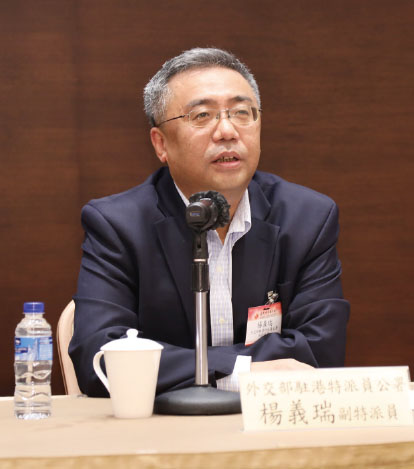The US military’s hasty withdrawal from Afghanistan has triggered a ripple effect on the global power map, with the Biden administration’s subsequent policy towards China attracting renewed attention. Despite such a shift, China remains confident in moving forward steadily.
 Following the Biden administration’s strategic setback in Afghanistan, Yang Yirui, Deputy Commissioner of the Ministry of Foreign Affairs in the HKSAR, believes that whatever tactics the US intends to adopt towards China, China’s policy towards the US remains the same, i.e. it wants the two countries to coexist peacefully.
Following the Biden administration’s strategic setback in Afghanistan, Yang Yirui, Deputy Commissioner of the Ministry of Foreign Affairs in the HKSAR, believes that whatever tactics the US intends to adopt towards China, China’s policy towards the US remains the same, i.e. it wants the two countries to coexist peacefully.
Shift in world’s economic centre of gravity causes anxiety in the US
Yang believes that one must first start from the backdrop of the times in order to understand Sino-US relations. He said that the West has dominated the world order for centuries due to its well-developed economies. However, following its opening-up and reform, China has now caught up with them and is now second only to the US by GDP. Furthermore, developing countries have gradually gained more weight in terms of economic aggregates. Therefore, Yang pointed out that this is a major global shift that has not been seen in a century. The rise of China has made the US even more sensitive and anxious about it.
The situation became even more pronounced after Trump took office in 2017 as he began his attempts to suppress China through trade and tech wars. The US fabricated many excuses to justify its actions. Yang pointed out that it is simply neither necessary nor possible for China and the US to change each other, as doing so completely turns a blind eye to all that has been achieved in Sino-US relations over the past decades.
In addition, the US also said that it suffers big losses after helping China to join the World Trade Organization as it has resulted in a huge trade deficit with China that must be reversed. In Yang’s view, it must not be forgotten that China has also provided huge business opportunities for US multinational companies.
Biden administration’s stance towards China remains unchanged
 After Trump, Biden has largely retained his predecessor’s tough stance on China. Yang said that the Biden administration defines US relations with China within the framework of “cooperation, competition, confrontation”, in which “cooperation” is of a limited nature, “competition” can be regarded as neutral and fair competition, and “confrontation” is actually still the stance of the US. However, Yang believes that the US uses hard tactics mixed with some soft tactics, which will rally its allies to gang up against China. With the US economy severely hit by the pandemic, the more important task for Biden is to stimulate the economy.
After Trump, Biden has largely retained his predecessor’s tough stance on China. Yang said that the Biden administration defines US relations with China within the framework of “cooperation, competition, confrontation”, in which “cooperation” is of a limited nature, “competition” can be regarded as neutral and fair competition, and “confrontation” is actually still the stance of the US. However, Yang believes that the US uses hard tactics mixed with some soft tactics, which will rally its allies to gang up against China. With the US economy severely hit by the pandemic, the more important task for Biden is to stimulate the economy.
Yang expects that the US suppression of China will only continue as the latter is likely to surpass the former to become the world’s largest economy by 2030. By that time, various countries will leverage the Chinese market, achieving growth by riding on China’s growth. Hence, he believes that the next five to ten years will be a critical period for the change of power between the two countries.
China is willing to cooperate with the US without fear of competition
As for China’s policy towards the US, Yang said that its fundamental policy remains unchanged. It is China’s consistent view that good Sino-US relations are in the fundamental interests of the people of both countries. Yang said that it is sometimes out of China’s control given the current circumstances. “We are willing to cooperate and not afraid of competition, but we will also fight to the end in any confrontation.”
Yang believes that “cooperation benefits both countries while confrontation serves neither” and hopes the US would not get stuck in the old ways and attempt to use old thinking to deal with the new China. As the saying goes, “if unity is sought through struggle, it will live; if unity is sought through yielding, it will perish”. Yang believes that the US’s actions should not be condoned, but it is unlikely to succeed in its attempt to suppress China.
Hong Kong still has much to offer with its special status
 Yang further said that the change of regime in Afghanistan and the hurried departure of its president fully reflect the collapse of the US’s international reputation, clearly showing that the US could abandon any place whenever the place is no longer useful to the US. Yang said that this is very likely to be a turning point to prove that the US actually has neither the ability nor the means to change a country. How can it handle China if it can’t even deal with Afghanistan?
Yang further said that the change of regime in Afghanistan and the hurried departure of its president fully reflect the collapse of the US’s international reputation, clearly showing that the US could abandon any place whenever the place is no longer useful to the US. Yang said that this is very likely to be a turning point to prove that the US actually has neither the ability nor the means to change a country. How can it handle China if it can’t even deal with Afghanistan?
Regarding Hong Kong’s situation, Yang noted that Hong Kong has been the single economy providing the US with its biggest trade surplus for many years. Therefore, it will only harm the interests of the US business community if the US rashly revokes Hong Kong’s status as an independent customs territory. At the same time, Yang pointed out the interests of Hong Kong and the US are intertwined, so he does not think the US would intervene in the linked exchange rate system lightly. In summary, he pointed out that as Hong Kong has a special status and is also part of China, it still has much to offer during development under the “dual circulation” strategy and the “14th Five-Year” Plan.
This is an abstract of the Chamber’s National Studies Class: “Hong Kong’s Future in the Context of Sino-US Rivalry”.




